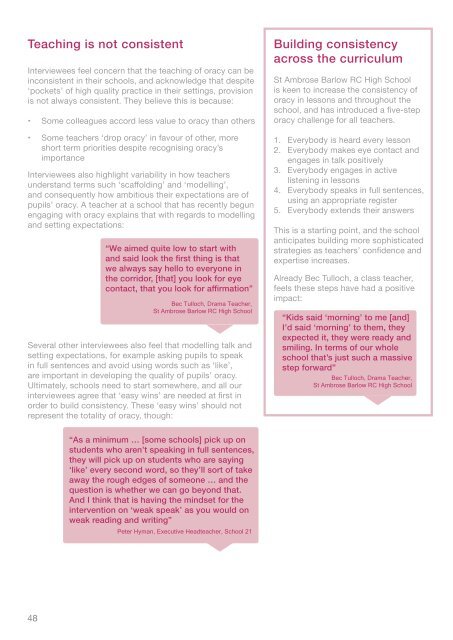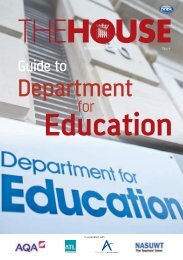Oracy
2fcBkno
2fcBkno
You also want an ePaper? Increase the reach of your titles
YUMPU automatically turns print PDFs into web optimized ePapers that Google loves.
Teaching is not consistent<br />
Interviewees feel concern that the teaching of oracy can be<br />
inconsistent in their schools, and acknowledge that despite<br />
‘pockets’ of high quality practice in their settings, provision<br />
is not always consistent. They believe this is because:<br />
• Some colleagues accord less value to oracy than others<br />
• Some teachers ‘drop oracy’ in favour of other, more<br />
short term priorities despite recognising oracy’s<br />
importance<br />
Interviewees also highlight variability in how teachers<br />
understand terms such ‘scaffolding’ and ‘modelling’,<br />
and consequently how ambitious their expectations are of<br />
pupils’ oracy. A teacher at a school that has recently begun<br />
engaging with oracy explains that with regards to modelling<br />
and setting expectations:<br />
“We aimed quite low to start with<br />
and said look the first thing is that<br />
we always say hello to everyone in<br />
the corridor, [that] you look for eye<br />
contact, that you look for affirmation”<br />
Bec Tulloch, Drama Teacher,<br />
St Ambrose Barlow RC High School<br />
Several other interviewees also feel that modelling talk and<br />
setting expectations, for example asking pupils to speak<br />
in full sentences and avoid using words such as ‘like’,<br />
are important in developing the quality of pupils’ oracy.<br />
Ultimately, schools need to start somewhere, and all our<br />
interviewees agree that ‘easy wins’ are needed at first in<br />
order to build consistency. These ‘easy wins’ should not<br />
represent the totality of oracy, though:<br />
Building consistency<br />
across the curriculum<br />
St Ambrose Barlow RC High School<br />
is keen to increase the consistency of<br />
oracy in lessons and throughout the<br />
school, and has introduced a five-step<br />
oracy challenge for all teachers.<br />
1. Everybody is heard every lesson<br />
2. Everybody makes eye contact and<br />
engages in talk positively<br />
3. Everybody engages in active<br />
listening in lessons<br />
4. Everybody speaks in full sentences,<br />
using an appropriate register<br />
5. Everybody extends their answers<br />
This is a starting point, and the school<br />
anticipates building more sophisticated<br />
strategies as teachers’ confidence and<br />
expertise increases.<br />
Already Bec Tulloch, a class teacher,<br />
feels these steps have had a positive<br />
impact:<br />
“Kids said ‘morning’ to me [and]<br />
I’d said ‘morning’ to them, they<br />
expected it, they were ready and<br />
smiling. In terms of our whole<br />
school that’s just such a massive<br />
step forward”<br />
Bec Tulloch, Drama Teacher,<br />
St Ambrose Barlow RC High School<br />
“As a minimum … [some schools] pick up on<br />
students who aren’t speaking in full sentences,<br />
they will pick up on students who are saying<br />
‘like’ every second word, so they’ll sort of take<br />
away the rough edges of someone … and the<br />
question is whether we can go beyond that.<br />
And I think that is having the mindset for the<br />
intervention on ‘weak speak’ as you would on<br />
weak reading and writing”<br />
Peter Hyman, Executive Headteacher, School 21<br />
48




